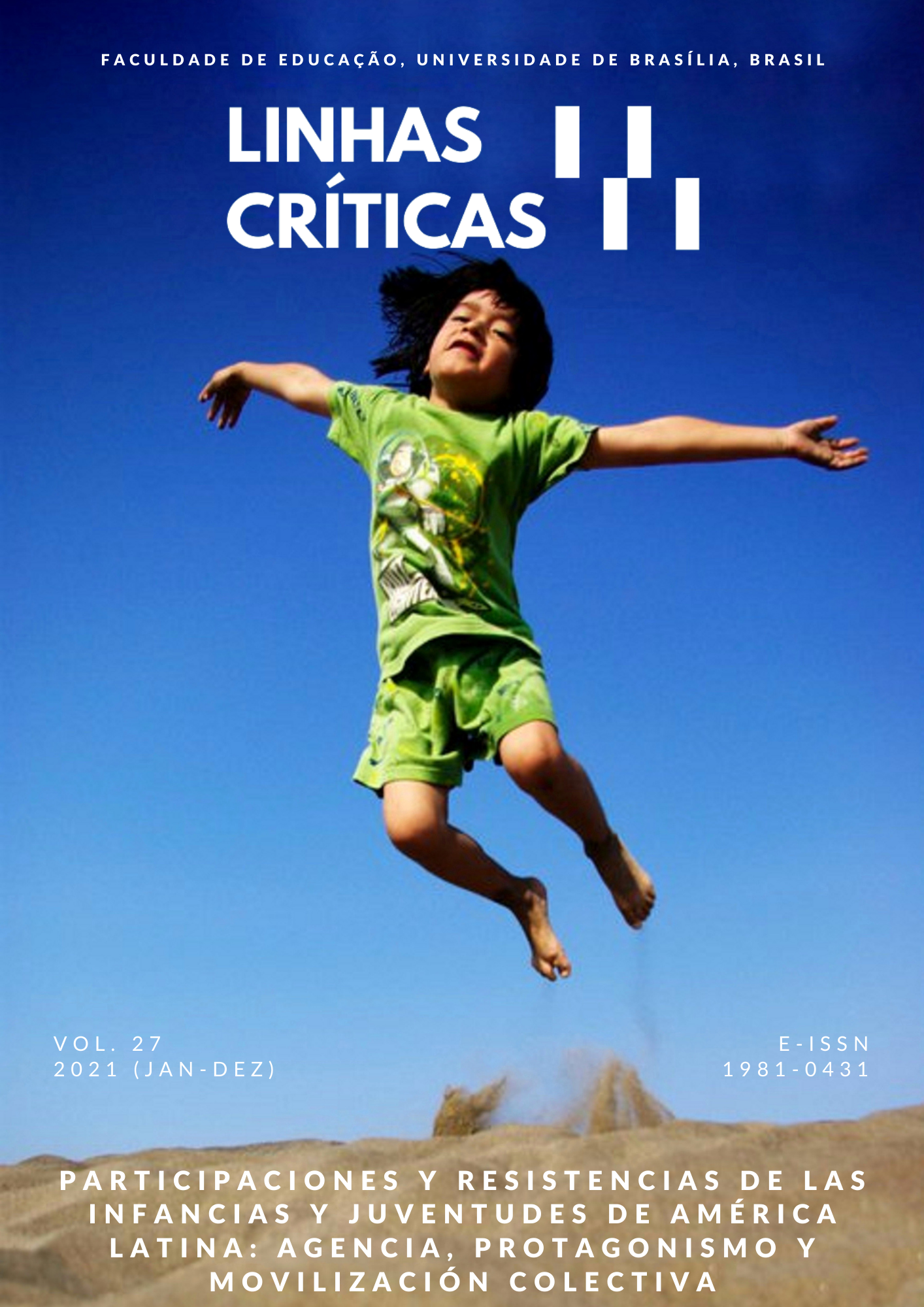Rhetoric as a teledramaturgical resource
Plato's and Aristotle's concepts in audiovisual narrative
DOI:
https://doi.org/10.26512/lc27202140348Keywords:
Rhetoric, Audio-visual, Soap OperaAbstract
By opting for the analysis of Rhetoric, applying the classic concepts of Plato and Aristotle, this present work proposes a relationship with contemporary cultural studies on audiovisual fictions. Based on the analysis of the Brazilian telenovela O outro lado do paraíso (Mendonça Filho, 2017-2018), we seek to understand how the television narrative construction takes place through argumentation and persuasion and, consequently, why the fascination of current audiovisual productions through the staging of a court in the dramatic constitution. As a result, the use of Rhetoric in the audiovisual script is pointed out as a determinant for the foundation of the final message.
Downloads
References
Aristóteles. (1990). Arte Retórica e Arte Poética (14ª ed. Tradução de Pinto de Carvalho). Ediouro.
Benício, J. (2017, outubro 17). Pega-pega acerta ao discutir ética em plena crise moral. Portal Terra. https://www.terra.com.br/diversao/tv/blog-sala-de-tv/pega-pega-acerta-ao-discutir-etica-em-plena-crise-moral,51eaf4a46e51d60f4ad943e7e07d6ef8k1c5sspy.html
Bourdieu, P. (1996). As regras da arte: gênese e estrutura do campo literário. Companhia das Letras.
Calza, R. (1996). O que é telenovela. Editora Brasilense.
Carrilho, M. M (1990). Verdade, suspeita e argumentação. Presença.
Eco, U (1991). Debates: Estética. Perspectivas.
Eleodoro, D. R. M. (2009). Línguas-culturas e retórica. Análise comparada de produções dissertativo-argumentativas em língua francesa e língua portuguesa na esfera escolar. [Tese de doutorado, Universidade de São Paulo]. Repositório Biblioteca Digital da USP. https://doi.org/10.11606/T.8.2009.tde-05022010-173540
Falcão, D. (2018, fevereiro 17). Laura depõe contra Vinícius: "as mãos fortes me prendiam". Portal UOL. https://natelinha.uol.com.br/novelas/2018/02/17/laura-depoe-contra-vinicius-as-maos-fortes-me-prendiam-114511.php
Foucault, M. (1987). Vigiar e punir: nascimento da prisão (Tradução de Raquel Ramalhete). Vozes.
França, V., & Simões, P. (2007). Telenovelas, telespectadores e representações do amor. ECO-PÓS, 10(2). https://revistaecopos.eco.ufrj.br/eco_pos/article/view/1017/957
Hall, S., & Woodward, K. (2003). Identidade e Diferença. A perspectiva dos Estudos Culturais (Tradução de Tomaz Tadeu da Silva). Vozes.
Hasak, A. (Criador). (2016-2018). Shades of blue [série de TV]. NBC.
Isócrates. (2014). Elogio de Helena (Trad. de A. Dinucci, 1ª ed.). Ediufs.
Kelley, D. (Produtor executivo). (2004-2008). Boston Legal [série de TV]. ABC.
Kessler, T., & Zelman, D. (Criadores). (2007-2012). Damages [série de TV]. FOX.
King, R., & King, M. (Criadores). (2009-2016). The Good Wife [série de TV]. CBS.
Kogut, P. (2018, outubro 26). O outro lado do paraíso registra recorde semanal no Rio e em São Paulo. Jornal O Globo. http://kogut.oglobo.globo.com/noticias-da-tv/audiencia/noticia/2018/02/o-outro-lado-do-paraiso-registra-recorde-semanal-no-rio-e-em-sao-paulo.html
Korsh, A. (Criador). (2011-2019). Suits [série de TV]. USA Netword.
Lopes, M. I. V. (2009). Telenovela como recurso comunicativo. MATRIZes, 3(1), 21-47. https://doi.org/10.11606/issn.1982-8160.v3i1p21-47
Mendonça Filho, M. (Diretor). (2017-2018). O outro lado do paraíso [telenovela]. TV Globo.
Motter, M. L. (2011). A telenovela: documento. Revista USP, nº 48. Dezembro/fevereiro.
Nowalk, P. (Criador). (2014-2020). How to get away with murder [série de TV]. ABC.
Piskunova, S. (2004). El género de la novela y la tradición retórica (El caso Del “Persilles” y de las “Almas Muertas”). Actas del V Congreso Internacional del Cervantistas, Moscú, Rusia. https://cvc.cervantes.es/literatura/cervantistas/congresos/cg_V/cg_V_44.pdf
Platão. (1959). Gorgias. Dodds.
Platão. (1976). Górgias. O Banquete. Fedro (Trad., introd. e notas de M. O. Pulquério, M. T. S. Azevedo e J. R. Ferreira, 2º ed.). Edições 70.
Parmênides. (2009). Poema de Parmênides: Da Natureza (Trad. e comentários de F. Santoro, 1ª ed.). Ousia.
Santos, J. G. T. (2011). Górgias e o Górgias de Platão. Archai, 7. https://periodicos.unb.br/index.php/archai/article/view/8251/6762
Stuever, H. (2021, outubro 08). It’s hard to stop watching ‘Seven Seconds’ — and that’s still the surest sign of a good TV show. Washington Post. https://www.washingtonpost.com/entertainment/tv/its-hard-to-stop-watching-seven-seconds--and-thats-still-the-surest-sign-of-a-good-tv-show/2018/02/22/c1473860-1749-11e8-92c9-376b4fe57ff7_story.html?utm_term=.552d8159bf32
Wolf, D. (Criador). (2017). Chicago justice [série de TV]. NBC.
Published
How to Cite
Issue
Section
License
Copyright (c) 2021 Valmir Moratelli

This work is licensed under a Creative Commons Attribution 4.0 International License.
Authors who publish in this journal agree to the following terms:
-Authors maintains the copyright and grants the journal the right of first publication, the work being simultaneously licensed under the Creative Commons Attribution License which allows the sharing of the work with recognition of the authorship of the work and initial publication in this journal.
- Authors are authorized to enter into additional contracts separately, for non-exclusive distribution of the version of the work published in this journal (eg publish in institutional repository or as a book chapter), with acknowledgment of authorship and initial publication in this journal.
-Authorers are allowed and encouraged to publish and distribute their work online (eg in institutional repositories or on their personal page) at any point before or during the editorial process, as this can generate productive changes as well as increase the impact and the citation of published work (See The Effect of Free Access).



